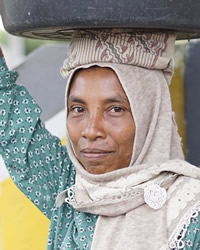Geser-Gorom in Indonesia

Photo Source:
Anonymous
|
Send Joshua Project a map of this people group.
|
| People Name: | Geser-Gorom |
| Country: | Indonesia |
| 10/40 Window: | Yes |
| Population: | 82,000 |
| World Population: | 82,000 |
| Primary Language: | Geser-Gorom |
| Primary Religion: | Islam |
| Christian Adherents: | 2.00 % |
| Evangelicals: | 0.00 % |
| Scripture: | Translation Started |
| Ministry Resources: | No |
| Jesus Film: | No |
| Audio Recordings: | No |
| People Cluster: | Maluku-Central |
| Affinity Bloc: | Malay Peoples |
| Progress Level: |
|
Introduction / History
The Geser-Gorom live on Gorom island and the East end of neighboring Seram island in Maluku Province, Indonesia. The name "Geser-Gorom" (literally, "slide over to Gorom") reflects the belief that they are the portion of the original people of the world who "slid over" to the east to neighboring Gorom Island.
The Geser-Gorom language is part of a larger linguistic grouping called the Banda-Geser which also includes the Banda, Bati and Watubela. The Geser-Gorom language has three dialects: "Gorom Laut", "Mina Mina Gorom" and "Kelimuri".
What Are Their Lives Like?
The Geser-Gorom primarily make a living through farming and fishing. Crops include rice, potatoes, sweet potatoes, bananas, legumes, sago palm and coconuts. Rice and sago form the main staples. Their "Kabasa" ceremony honors the spirits believed to influence the harvest.
Nuclear families function as the basic social unit in society. The Geser-Gorom practice a patrilineal extended family system and newly married couples usually live near the husband's extended family. Fathers typically lead each family and support the family's living needs. Wives take care of children, cooking and other household duties.
Traditionally, the Geser-Gorom have been ruled by a king, assisted by a council composed of a leader (a customary chief who adjudicate land and inheritance disputes) and a security chief who is the interpreter of news. Since the time of Japanese occupation in World War II, the system of leadership has been gradually disappearing.
What Are Their Beliefs?
The Geser-Gorom hold to Islam, combined with traditional animistic and mystical beliefs. They apply a mixture of Islamic and tribal law.
What Are Their Needs?
The Geser-Gorom need modernization of education and technology, along with opportunities to improve their work skills. They also need a translation of the Bible; no Scriptures exist in their language today.
Prayer Points
Pray for translation of the Bible into the Geser-Gorom language, and for God to place a hunger for truth in the people's hearts.
Ask God to raise up workers who can bring educational and technological advances to the people to improve their living conditions.
Pray for freedom from the false religions of Islam and animism.
Ask Jesus to appear to family leaders in dreams and visions, and to draw entire households to the Father.
Pray for a Disciple Making Movement among the Geser-Gorom that will not only multiply disciples in this people but will spread to the neighboring peoples.